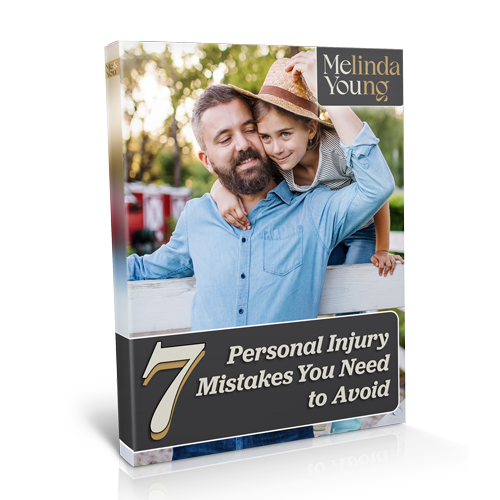
Suing Your Employer After a Workplace Injury
Do You Need Legal Help?
We offer free consultations.

Kansas Injury Lawyers Fighting for You.
When you’re in an accident and you are facing challenges you never expected, we are here to help. You deserve to have someone fighting on your side who can help you get the results you deserve. All of your injuries and damages deserve to be compensated for. Our Kansas injury lawyers are here to help you every step of the way.
We will work with you to build a strong case right away. We have the experience and resources to handle all legal aspects of your case. Your main focus should be on your health and well-being. Let us focus on building a strong case and using all of our resources to ensure you get the best results possible.


Download Our Free Personal Injury PDF Guide
Please enter your information below.
The Basics of Workers’ Compensation in Kansas
Kansas’ workers’ compensation system is a no-fault system, meaning that employees are entitled to benefits regardless of who was at fault for the injury. This is intended to provide swift compensation to injured workers without the need for lengthy litigation. Covered benefits typically include medical treatment related to the injury, temporary disability benefits to replace lost wages during recovery, permanent disability benefits if the injury results in a lasting impairment, and vocational rehabilitation services if necessary to help injured workers return to employment.Reporting Your Injury
One of the most crucial steps following a workplace injury is to promptly report it to your employer. In Kansas, you are required to report the injury within a specific timeframe to be eligible for workers’ compensation benefits. Failure to report the injury in a timely manner could jeopardize your ability to receive the benefits you deserve. Once reported, your employer should provide you with a list of approved medical providers where you can seek treatment for your injury.Seeking Medical Treatment
Obtaining proper medical treatment is essential not only for your recovery but also for documenting the extent of your injury. In Kansas, you have the right to choose your treating physician from a list provided by your employer. It is important to communicate the details of your injury and symptoms accurately to your doctor to ensure that your medical records reflect the full scope of your condition. These records will play a significant role in determining the benefits you are entitled to under the workers’ compensation system.Filing Your Claim
After seeking medical treatment, the next step is to file a workers’ compensation claim with the Kansas Division of Workers’ Compensation. This involves submitting various forms and documentation, including medical records and any relevant witness statements. The claims process can be complex, and any errors or omissions in your application could delay the approval of your benefits.Appealing a Denied Claim
Unfortunately, not all workers’ compensation claims are approved initially. If your claim is denied, you have the right to appeal the decision through the Kansas Division of Workers’ Compensation. This process involves presenting additional evidence and arguments to support your claim. It is highly recommended to seek legal representation during the appeals process to increase your chances of a successful outcome.Understanding Your Rights as an Injured Worker
As an injured worker in Kansas, you have certain rights and protections under the law. These include the right to receive necessary medical treatment for your work-related injury, the right to return to your job once you are medically cleared, and protection from retaliation by your employer for filing a workers’ compensation claim. Understanding and asserting these rights is crucial to ensuring that you receive the benefits and protections you are entitled to under Kansas law.The Importance of Timely Legal Advice
Seeking legal advice as soon as possible after your workplace injury is crucial. An experienced workers’ compensation attorney can provide guidance on what steps to take to protect your rights and ensure you receive the appropriate medical care and benefits. They can also advise you on how to communicate with your employer and the insurance company to avoid potential pitfalls that could jeopardize your claim. Early intervention by an attorney can significantly increase the likelihood of a successful outcome in your case.Dealing with Insurance Companies
Insurance companies are primarily concerned with minimizing their financial liabilities, which can sometimes lead to them undervaluing or denying legitimate claims. Having legal representation can level the playing field by ensuring that your rights are protected and that you are not taken advantage of during negotiations. An attorney can advocate on your behalf so that the insurance company fulfills its obligations under the law and provides you with fair compensation for your injuries and losses.Understanding Permanent Disability Benefits
If your workplace injury results in a permanent impairment that affects your ability to work, you may be entitled to permanent disability benefits. These benefits are intended to compensate you for the loss of earning capacity caused by your injury. Determining the extent of your permanent disability can be complex and often requires medical evaluations and vocational assessments.Protecting Your Employment Rights
Fear of retaliation by your employer should not prevent you from seeking the workers’ compensation benefits you are entitled to under Kansas law. It is illegal for employers to discriminate against or terminate employees for filing a workers’ compensation claim. If you believe that you have been unfairly treated or retaliated against because of your injury or claim, an attorney can help you understand your rights and take legal action to protect your employment status.Negotiating a Settlement
In some cases, the insurance company may propose a settlement offer to resolve your workers’ compensation claim. It is essential to carefully evaluate any settlement offer to ensure that it adequately compensates you for your medical expenses, lost wages, and future needs related to your injury. An attorney can review the terms of the settlement offer and negotiate on your behalf to secure a fair and equitable resolution. They can also advise you on whether accepting a settlement offer is in your best interests based on the specific circumstances of your case.Pursuing Third-Party Claims
In addition to filing a workers’ compensation claim, you may have grounds to pursue a third-party liability claim if someone other than your employer contributed to your workplace injury. For example, if your injury was caused by a defective piece of equipment or the negligence of a subcontractor, you may be able to seek additional compensation through a personal injury lawsuit. An attorney can assess the circumstances of your injury and determine whether you have a viable third-party claim that could result in additional compensation beyond workers’ compensation benefits.The Role of Vocational Rehabilitation
If your injury prevents you from returning to your previous job or industry, you may be eligible for vocational rehabilitation services. These services are designed to help injured workers acquire new skills or training that will enable them to transition into a new job or career path. Vocational rehabilitation can be a critical component of your recovery and long-term financial stability. An attorney can advocate for your right to vocational rehabilitation services and ensure that you receive the support you need to achieve a successful return to work.Keeping Up with Legal Requirements
Navigating the workers’ compensation system involves adhering to strict deadlines and legal requirements. Missing a deadline or failing to submit the necessary documentation could result in delays or denial of your benefits. An attorney who is familiar with the intricacies of Kansas workers’ compensation law can help you stay on track and ensure that all requirements are met in a timely manner. They can also handle communications with the Kansas Division of Workers’ Compensation and other parties involved in your case to streamline the process and minimize delays.The Emotional Toll of a Workplace Injury
Dealing with a workplace injury can take a significant emotional toll on you and your loved ones. From physical pain and discomfort to financial worries and uncertainty about the future, the challenges can feel overwhelming. It is essential to prioritize your well-being and focus on your recovery during this difficult time. Seeking support from family, friends, and healthcare professionals can help you cope with the emotional and psychological aspects of your injury. Additionally, having a compassionate attorney who understands your situation can provide reassurance and peace of mind as you navigate the legal aspects of your case.Common Reasons for Workers’ Compensation Denials in Kansas
Understanding why your workers’ compensation claim was denied is the first step in challenging the decision. In Kansas, there are several common reasons why claims may be denied. One of the most frequent reasons is the failure to report the injury in a timely manner. Kansas law requires that workers report their injuries to their employer within 20 days of the incident. If this deadline is missed, the claim may be denied on the grounds of late reporting. Additionally, if the injury is not immediately apparent, workers have a maximum of 30 days to report the injury after they become aware of it. Another common reason for denial is the lack of evidence to support the claim. The workers’ compensation system requires that there be clear and convincing evidence that the injury occurred as a result of work-related activities. If the employer or their insurance company disputes the claim, they may argue that the injury was not work-related, that it was a pre-existing condition, or that it did not occur in the course and scope of employment. In such cases, the lack of supporting medical records or witness statements can lead to a denial of benefits. Discrepancies in the worker’s account of the injury can also lead to a denial. If the worker’s description of the incident changes over time, or if it conflicts with other evidence, the insurance company may question the validity of the claim. This is why it is essential to be consistent and truthful when reporting the injury and discussing it with medical professionals.What to Do After a Workers’ Compensation Denial
If your workers’ compensation claim has been denied, it is important not to lose hope. In Kansas, you have the right to appeal the decision, and there are several steps you can take to challenge the denial. The first step is to carefully review the denial notice you received. This document will outline the reasons for the denial and provide you with a better understanding of what went wrong with your claim. Once you have reviewed the denial notice, you should gather any additional evidence that may support your claim. This may include medical records, witness statements, and any other documentation that can help prove that your injury was work-related and that it occurred in the course and scope of your employment. It is also a good idea to seek a second medical opinion, especially if the insurance company is disputing the severity of your injury or its connection to your job. In Kansas, the next step after receiving a denial is to file an application for a hearing with the Kansas Division of Workers’ Compensation. This hearing is your opportunity to present your case before an administrative law judge who will review the evidence and make a determination on your claim. The process can be complex, and it is highly recommended that you seek legal representation to help you navigate the appeals process.The Appeals Process: What to Expect
The appeals process for a workers’ compensation denial in Kansas begins with the filing of an application for a hearing. This application must be filed within 200 days of the date of injury or within 200 days of the last payment of compensation, whichever is later. If you miss this deadline, you may lose your right to appeal the denial. Once your application has been filed, your case will be scheduled for a hearing before an administrative law judge. During the hearing, both you and the insurance company will have the opportunity to present evidence and make arguments in support of your positions. The judge will review the evidence and issue a decision on your claim. If the judge rules in your favor, your benefits will be reinstated, and you may be entitled to back pay for any benefits that were wrongfully denied.Do you have questions about suing your employer after a workplace injury? Watch this video to learn why you might not be able to.
Question:
Can I sue my employer for my construction accident injury?Answer:
A lot of people want to know when they’ve been injured on a construction site if they can sue their employer in Kansas. In Kansas, it is going to depend on the nature of your relationship with your employer. If you are truly an employee, then the Kansas Workers’ Compensation law states that the Kansas Workers’ Compensation Act is your sole remedy. In that scenario, you would not be able to pursue a claim or file suit against your employer. There may, however, be other contractors involved on the job site that against whom you may be able to pursue a claim and who may, in fact, be responsible for your injuries.
If you are injured on a construction site, give us a call so that we can talk through the details of your case and help determine what claims are available to you.Were you or a loved one hurt in a construction accident in Kansas and have questions about suing your employer after a workplace injury? Contact our experienced Kansas construction accident lawyers today for a free consultation and case evaluation. Like us on Facebook
Client Reviews
![]()



